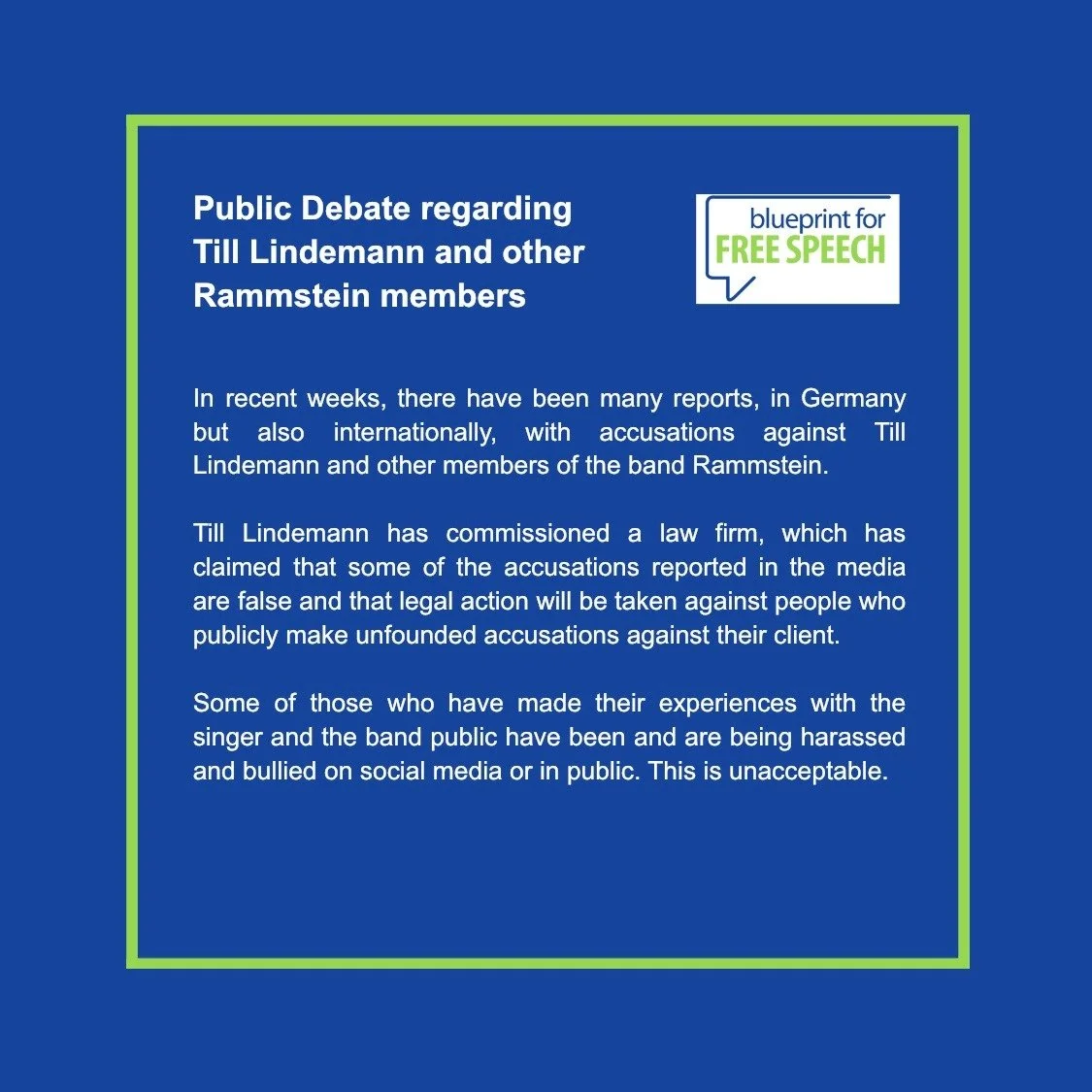Public Debate regarding Till Lindemann and other Rammstein members
In recent weeks, there have been many reports, in Germany but also internationally, about accusations against Till Lindemann of the band Rammstein.
Till Lindemann has commissioned a law firm, which has claimed that some of the accusations reported in the media are false and that legal action will be taken against people who publicly make unfounded accusations against their client1.
Some of those who have made their experiences with the singer and the band public have been and are being harassed and bullied on social media or in public.
We think that a public debate about such accusations must be possible. The approach Till Lindemann and his colleagues are taking towards the media is considered by some to be an obstacle to further investigation into the issues that have been raised.
German journalists tell us that the public image of the singer and the band is carefully protected by strategic interventions by lawyers and other advisors, making it difficult to get stories published.
Blueprint for Free Speech is a non-profit charity that works internationally to promote the right to freedom of expression. In Europe, we are conducting our work in the face of increasing restrictions on the right to participate in public debate and restrictions of the right to participate in public discourse.
Stories shared publicly from those who are directly affected have the power to raise social awareness, challenge existing norms and bring about positive change. The courage to speak out can be a catalyst for positive change in our society and pave the way for a safer and more supportive environment for all.
Participants in public debate and especially those affected by any form of assault, misconduct, harassment or violence are protected by law - but this can require access to resources that are not always easy to find. We can help to ensure that people who want to participate in public discourse have access to trustworthy support networks.
We will help you to exercise your right to freedom for expression.
The right to freedom of expression
Article 11 of the Charter of Fundamental Rights of the European Union states:
"Everyone has the right to freedom of expression. This right shall include freedom to hold opinions and to receive and impart information and ideas without interference by public authority and regardless of frontiers."
This also applies to reports about your own experiences, including those that have been stressful, distressing or unpleasant.
Intimidation by legal means
Protection of personal reputation is also part of the basic democratic order. However, the legal tools most often used to protect reputation can be abused. Lawyers’ letters and legal warnings should not be used to intimidate and suppress legitimate public speech.
We develop preventive measures against such forms of intimidation. And make these measures (legal advice, payment of costs) accessible to people who are threatened because of their public statements.
How to speak publicly about your experiences
Be aware of when you start speaking out publicly. Social media can feel conversational and informal, but it is important to recognise that, for legal purposes, social media posts count as publications, just as much as newspapers do
When you do speak publicly: Make sure you only describe incidents as factual ('this or that happened') when you are absolutely sure and ideally have evidence
Consider using the option to remain anonymous, if that is open to you. That may mean using a social media account that does not use your own personal details, or perhaps sharing your story with a journalist
Journalists have an ethical duty to protect their sources. Look for journalists who have successfully covered similar issues in the past and who have treated their sources respectfully in print. Some journalists will offer public advice on how to get in touch with them without sharing your identity
If you feel that you need legal or otherwise before telling your story, we can help you locate those resources. Contact us on Session, an encrypted private messaging app, using the following Session ID:
053323c0d4341714c8f95bb7f21a59f42e015d7602c64c018083cf49aa5c023a55
How to safely report incidents/assaults you have witnessed as an outsider
If you are an outsider and have observed situations that seem questionable to you and want to report them, there are many ways to do so. Journalists have an ethical responsibility to protect their sources.6 Also, there is now extensive legal protection for whistleblowers in all countries of the European Union.8 We are happy to help you if you contact us on Session. Your testimony can help people affected by violence.
Remember: it is your right to speak out and share your side of a story publicly. You should decide what feels right for you. There is strength in every voice, and your story could encourage others and bring about positive change. No matter how you share or express yourself, be aware that your right to speak out is an inviolable fundamental right.
Contact
You can reach us via the encrypted communication app Session. Session is cross-platform based and end-to-end encrypted, designed for confidentiality and anonymity for users. Session is developed by The Oxen Project as part of the non-profit Oxen Privacy Tech Foundation and relies on a decentralised blockchain-based network for message transmission7. For more information and to download Session, please visit: https://getsession.org/.
You can reach our Blueprint for Free Speech account there using Session ID:
053323c0d4341714c8f95bb7f21a59f42e015d7602c64c018083cf49aa5c023a55.
This way you can contact us safely and without revealing your identity. We are happy to help you on the above points, but cannot provide acute emergency assistance. In case of an emergency, contact the emergency services in your region or the general emergency number 112. We also recommend that you seek professional help from appropriate counselling centres for longer-term care.


